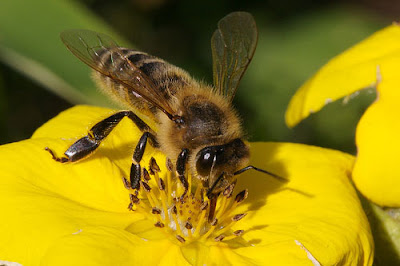THE INCREDIBLE HONEYBEE
 I gleaned a bit of info from the internet about these interesting little creatures and thought I'd share.
I gleaned a bit of info from the internet about these interesting little creatures and thought I'd share.One site said that Native Americans called bees the 'white man's fly' when they were brought here from Europe in the 1600s. I don't know if this was the honeybee. I thought Bees were always here.
I learned that Albert Einstein once predicted that if bees were to disappear, man would follow only a few years later. The depopulation of bees could have a huge impact on the environment, which is dependent on the insects for pollination. If taken to the extreme, crops, fodder, and therefore livestock could die off if there were no pollinating insects left.
From 1971 to 2006 approximately one half of the honeybee population have vanished. It is believed that numerous factors contribute to the decline. Urbanization, pesticides, mite infestation are part of the problem, but now there is also something called Colony Collapse Disorder, where bees fly off to find nectar and just never return to the hive. There is a lot of speculation as to why this is happening but I believe that insecticides are the biggest problem. I don't use them but resort to natural remedies.
Bees from one hive can visit a million flowers within a 400 mile square kilometer area in just one day.
It takes two million flowers worth of nectar to produce one pound of honey.
As for the benefits of honey and honeycomb, they are practically endless.
They have been used for centuries as medicine.
You can do a google search on this and learn a lot.
Lets all do our part to save these wonderful little insects. We need them.
Have a great weekend everyone.
God bless
|









0 Comments:
Post a Comment
<< Home